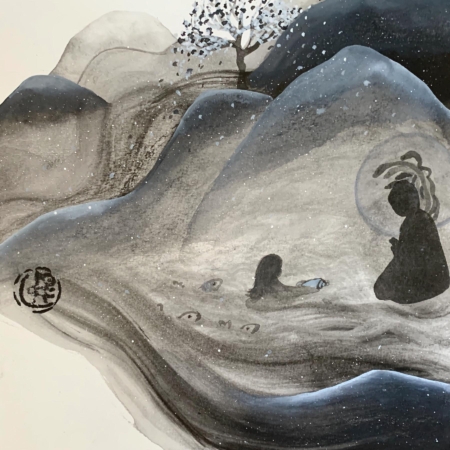As said by another:- "Nagarjuna also said no philosophy can lead one to enlightenment"
Yes, for me that is the key. The conceptual "justifications" we make for ourselves by identifying with particular philosophies, beliefs, theologies - all are ultimately barren. The closest you can get to the right attitude, from my reading, is in the Parable of the Raft from the Buddhist Theravada Scriptures....the Dharma as a means, not an end in itself. The various teachings, conceptions, are for crossing over not for grasping.
The dialectic is like the opposites in many ways. In the Christian tradition, at least on its mystical side, the ultimate reality that they call God is, in itself, beyond all the distinctions in terms of which we could make either assertions or denials about it. It lies outside all our categories of thought. Nevertheless it does somehow affect us, both as the ultimate ground of the universe and in our actions within the world.
Rather than an "ineffable Source" I prefer the eastern terms of "emptiness" (sunyata) and the subsequent "form is emptiness and emptiness is form" of the Mahayana Tradition.
This may all seem gobbledygook but it is not really so. When the mind sees the conflict in reason, when the mind/heart sees the pointlessness of conceptual thought as a means of discovering, or uncovering, Truth, then it really has nowhere to go but the present moment, unclouded by preconceptions. Therefore there falls away all "I-thou" relational spirituality, and the true "thou" is whoever we meet, whoever we see, as we live through our day. Reality unfolds, ever new. A constant advance into novelty.
Not really complex, in fact more like the experience of a child. Yet a child who has passed through the furnace of suffering and come out the other side.
Possibly adding to the gobbledygook..... Yet I look towards the plurality of our World's religious traditions, always seeking genuine correspondences between our Faiths.
Thinking myself on the words above regarding justifications and the present moment, I thought further of the NT passage in St Matthew Chapter 22 of the Christian NT:-
Thinking myself on the words above regarding justifications and the present moment, I thought further of the NT passage in St Matthew Chapter 22 of the Christian NT:-
Teacher, which is the greatest commandment in the Law?”
Jesus replied: “‘Love the Lord your God with all your heart and with all your soul and with all your mind." This is the first and greatest commandment. And the second is like it: ‘Love your neighbor as yourself.’ All the Law and the Prophets hang on these two commandments.”
This brings to mind the words of the Christian mystic Meister Eckhart:-
“In giving us His love God has given us the Holy Spirit so that we can love Him with the love wherewith He loves Himself.”
....a saying that the "zen man" D.T.Suzuki responded to by saying:-
“one mirror reflecting another with no shadow between them.”
and likened to the prajna wisdom of his own tradition, zen.
Surely it is good to see such correspondences? That such would be the living truth of a Reality, a Source, an Ultimate Ground that was truly Love?
Rather than argue for an "only way" linked solely to the tradition that we ourselves were born and raised in?











No comments:
Post a Comment